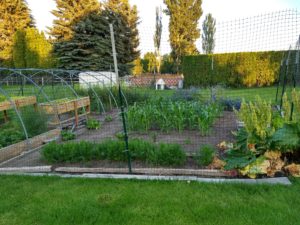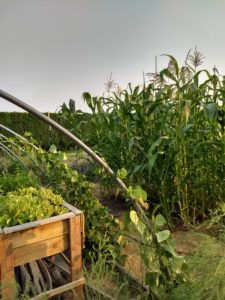Join me today as we get down and dirty to root out a few parallels between gardening and writing.
- Timing matters
The first few years we lived in Montana, a handful of warm, sunny April days always fooled me into thinking winter was over. Sparkling blue sky lured me outside where I chipped through ice to dig up black dirt. New life abounded—robins scouted for nest locations in the bare branches of apple, pear, and apricot trees that were just starting to bud. I couldn’t wait to get seeds in the ground.
Inevitably I planted too early—a spring blizzard usually dumped a foot of new snow the next day and the seeds never germinated. I’d have to buy more and try again weeks later when the weather finally warmed for real.
In those early days, I sent out novels that weren’t ready. In my eagerness to get published, I was blind to immature plots that needed more development and characters that didn’t ring true. Market conditions, pfft! Who needs to worry about that?
Often those submissions resulted in biting blizzards of rejection.
2. Persistence
Veteran Montana gardeners know to plant corn seeds three times in succession. The first batch rots because the soil is still too cold and wet; crows gobble the second round; with luck, the third grows and produces.
Nine earlier novels of mine didn’t make the grade. But I kept replanting to hit the right editor/agent at the right time. Gardeners and writers must be persistent and never give up.
3. Patience
Gardeners and writers must play the long game. Cherry trees don’t bear for seven years after they’re first planted. Books may require similar time from the initial seed of an idea to publication.
I’m more patient these days, willing to give my stories enough time to grow and ripen.
4. Dirty, backbreaking work
While my hands root around in the dirt, my mind stays busy digging out a more compelling plot, digging into the puzzling psyches of difficult characters, or digging out of the inadvertent rabbit hole I burrowed into.
Sometimes my mind winds up as muddy as my body.
5. Weeds, like bad habits, never die
Dandelions, black medic, and quack grass keep coming back no matter how often I pull them. Same with stubborn writing problems. Someone needs to invent Roundup for word tics, repetitions, misspellings, and excess verbiage.
6. Some crops do better in certain years than others
This July’s raspberries ripened fat, sweet, and juicy, while last summer they yielded only hard seeds. Peas that had been plentiful in the past did poorly this year, no matter how much I pampered the vines.
Sometimes I’ve written articles because the subject fascinated me yet they never found their way into print. Other stories I thought were ho-hum surprised me when editors accepted them and asked for more. Perhaps I was trying to sell peas in a market looking for raspberries.
7. Sometimes hard luck negates hard work
Rogue deer crash through the mesh fence and claim the salad bar for themselves. Aphids suck the life out of tomato plants. Grasshoppers strip plants down to mere stems. A freeze in August can destroy the harvest overnight.
Even so-called foolproof crops aren’t immune to whims of nature. One year I dug up what promised to be a bounty of potatoes to find voles had eaten the insides of every single spud, leaving only hollow shells behind.
After almost three decades of novels being rejected, my thriller Instrument of the Devil was published last year. The editor expressed strong interest in the second book in the series, Stalking Midas. I’d finally made it.
Right.
Six months later, the publisher closed up shop. Voles ate the heart out right of that potato crop.
8. Seasons ebb and flow in the garden and in writing
Here’s the current ebb and flow in my career:
Although I’m back in the submissions grind, at least I have lots of practice.
The first draft of book 3 in the series is close to complete and I’m still excited about the story.
Marketing keeps me spinning my wheels in the mud.
This regular gig at TKZ is great fun. I get to write about my passion, interact with interesting authors, and learn. What’s not to like?
Today in my garden, “the corn is as high as an elephant’s eye,” to quote the classic Rodgers and Hammerstein musical Oklahoma. In a few weeks, I look forward to breaking cobs off the stalks, rushing inside to nuke them in the microwave while still in their husks, then slathering them with butter. In that first burst of flavor, the memory of sore muscles from stooping, bending, and digging fades into the background.
But if a September hailstorm strips the garden bare, there’s always next spring with seeds of a new novel to plant.
TKZers, where are you in your seasons of writing?
Even though Debbie Burke is searching for a new publishing home, Instrument of the Devil remains available on Amazon here.




I can kill a cactus. Seriously. Kudos to you for the green thumb, Debbie. I love your series. When is the new one coming? I loved it.
Are you on Twitter? I promo all TKZ posts on Twitter & try to post the author, but I couldn’t find you.
Jordan, your kind words made me sing, “Oh what a beautiful morning!” Thank you for your encouragement and support. It means more than you know.
No Twitter yet but thanks for thinking of me. It’s on the to-do list (sigh).
A social media cautionary tale: a cyber-imposter just cloned my FB identity, used my photo, and sent PMs to a bunch of my friends telling them the great news that I’d just been selected as a $200K winner in a special Powerball lottery sponsored by FB…and if only my friends would send me $$, they’ll be winners too. FB’s advice: change my password, even though that’s not how the breach occurred. Fortunately a friend (who’s a Harvard PhD astrophysicist) figured out what had happened, contacted FB on my behalf, and got the bogus profile removed, but the effort wasted a whole day and left me feeling a bit gun-shy. If social media requires an astrophysicist to navigate, I’m way over my head.
I’ll send you a plastic cactus you can’t kill!
I think you just articulated a fun subplot for your heroine with her first foray into social media for the sake of a high school reunion line of communication. Ha!
Love that idea, Jordan! In fact, it could turn into a main plot of stolen identity.
Hahaha. I could, too!
I left the gardening to Hubster. When we lived in Florida, one of our biggest “predators” was our dog, who would eat everything from green onions to radishes to mangoes and avocados. I took care of the indoor plants, all of which were silk. The ones on the patio were in no man’s land, and usually died.
As for my writing – I’ve been orphaned by all of my publishers, and find the indie route avoids most of the unexpected seasonal setbacks
Terry, your “predator” dog cracked me up b/c our neighbor’s two Labs used to sneak over to our yard and eat raspberries.
The indie route sure gives an author total control and is very appealing. We’re fortunate to be writing in an age with options beyond traditional publishing.
Thanks for stopping by!
Love this post, Debbie! I’m not allowed anywhere near our garden, with good reason. My husband has the green thumb, mine is pure black. To show you how horrible I am with plants, I’ll share a quick story. My husband bought me an indoor plant: a money tree affectionally known as Mr. T. The very first week I set him on the deck so he could enjoy the fresh air. Well, that was my first mistake. The direct sunlight scorched all his leaves.
Somehow, he recovered.
I’ve drowned him several times, as well as let him dry out till his leaves shriveled in agony.
Somehow, he recovered.
Our grandchildren played tug of war with his leaves before I shrieked for them to let go. He looked a little scruffy for a while, but he recovered.
Two weeks ago, I was admiring his four big, beautiful leaves when I lost my balance and accidentally snapped the stem in half. Long story. Anyway, I panicked and stuck the stem in the soil next to his bare trunk — and it rooted! Mr. T now resembles a Charlie Brown Christmas tree without the benefit of pine needles or branches. Yet, he is the ultimate survivor! Like writers, he perseveres, even though I’ve almost killed him at least a dozen times in two years. 🙂
Great story of perseverance, Sue! Actually it sounds like a “cat” plant with nine lives!
Pingback: A Dirty Story – Debbie Burke
The voles, deer and dogs made me laugh out loud. I leave all the low hanging tomatoes for the possums, racoons and rats that I know are out there. Wish I could send a pic of this tomato I have. It’s now half eaten, sitting on the ground, with 3 sets of different teeth marks.
Three sets of teeth–wow. That’s amazing, Lynne. My wild critters don’t share like that. They always have to pick off their very own apple, take one bite, then pick off another. Wasteful little brats.
Well, you know I love me my metaphors. 🙂 And as a gardener, I can relate to this.
One more you might add: Don’t plant stuff that won’t grow where you planted it. When I lived in S. Florida, I fell hard for this tree called a Tibouchina. Beautiful purple flowers! What the unscrupulous nursery owner didn’t tell me was this tree grows only in places that have seasons and a certain kind of alkaline soil. Not South Florida, but maybe South Wales, Australia. Duhhhh….
I once tried to write a romantic suspense humor novel. I couldn’t sell it. I was out of my natural element. I should have named it “The Tibouchina Tree.”
“Don’t plant stuff that won’t grow where you planted it.” Great point, Kris! Writers need to know the requirements of the market and particular genre. Although the cross-pollination of romantic- suspense-humor would appeal to me.
In recent years, local nurseries have been selling citrus trees…in Montana??? They wouldn’t survive to November. Must be catering to homesick California transplants.
This is a great post, Debbie! I’ve definitely had my ups and downs in the garden and in my writing.
My first Bible study was pursued by a publisher and came out 3 years later. (No one warned me about the long journey to publication )
Now, 8 years later my second one is drawing no interest at all. So much for the advantages of being a published author.
One weed at a time, one paragraph at a time, one rejection at a time.
Thanks, Sherry!
Gardeners and writers both need infinite patience, esp. in the trad pubbing world where the progress barely outpaces a glacier. You’re so right about one weed, one paragraph at a time. Rejections go directly into the compost pile.
Best of luck with your second book. You did it once, you will do it again…it just may not happen quite the way you expected!
What a wise and multi-talented lady you are,Debbie.We stand in awe.Your philosophy applies to many areas of life.I’m printing it for future reference.
May a publisher for Stalking Midas appear soon!We are really looking forward to reading it.
Mea and Jim
Mary Ellen and Jim, how great to hear from you! Thanks for stopping by.
As society moves farther away from the agrarian life that humans lived for many centuries, nature’s lessons seem to be forgotten or lost…to our detriment.
Excuse the bad pun but gardening and nature keep me grounded.
Debbie, I loved the post. I share your pain as a long-term gardener who has fought with squirrels, rabbits, deer and moles ruining the grass.
Gardening and writing are two of my passions and they both have their “ups and downs.” Thanks again for a great post. I thoroughly enjoyed it.
Thank you, Frances! Wishing you good writing and garden w/o pests.
Just dug up a bunch of beautiful carrots yesterday. Always a triumph to find them intact without teeth marks or holes bored by insects.